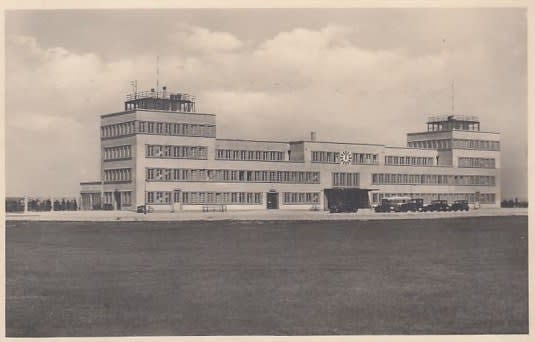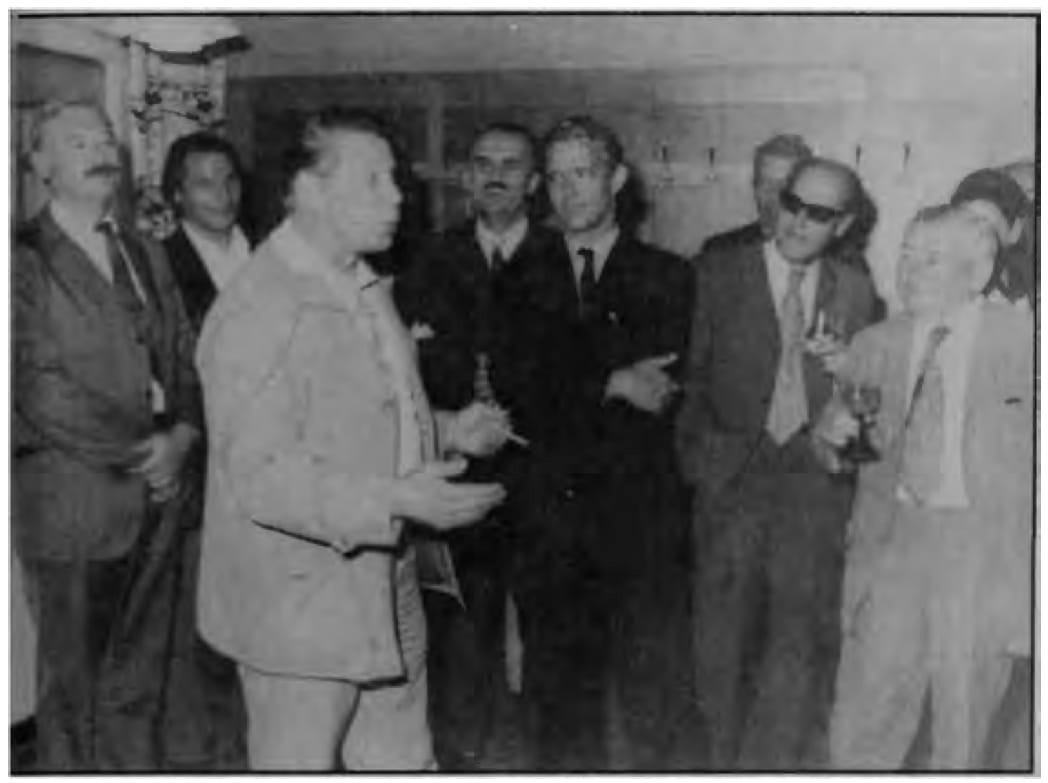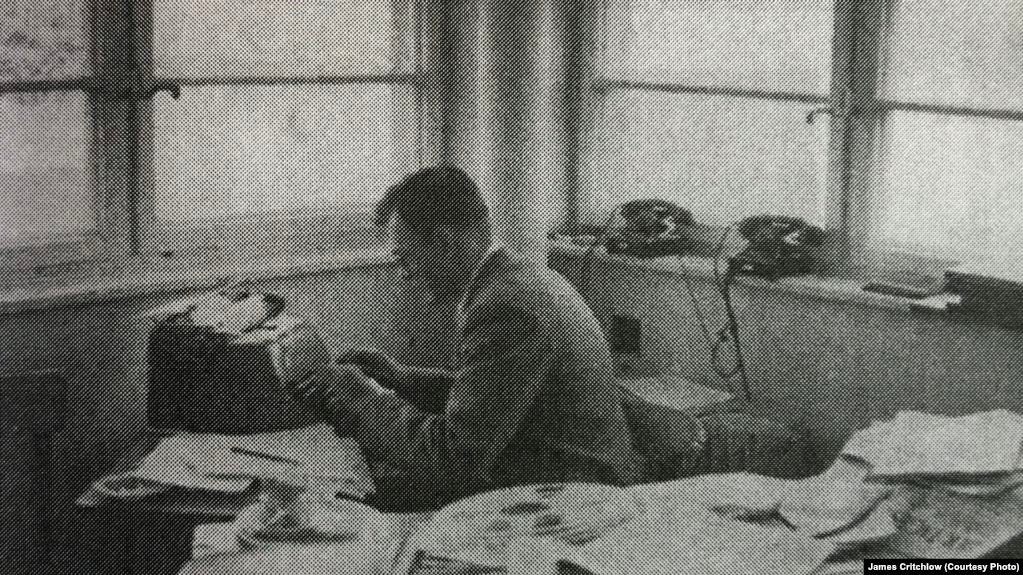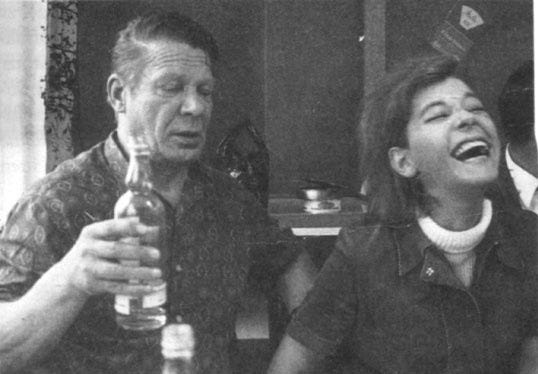Part Three: The schizoid world of a Soviet anti-communist propagandist
He had collaborated with the Nazis in a genocidal war against his own people, doing whatever it took to stay alive. Now he was working for the CIA, fighting against his own people yet again.
This is the first installment of a short historical investigative series about the origins of America’s propaganda machine — told through the story of one Soviet emigre who worked in it. Read parts one and two.
Radio Liberation’s HQ was located in this building in Munich’s Oberwiesenfeld airport. This is what it looked like in 1940 under the Nazis.
It was 1952. A year had passed since that meeting at the upscale River House club in Manhattan, and the Central Intelligence Agency finally began setting up its covert anti-communist radio station. Its offices were located in a building of a bombed-out airport in the heart of Munich.
Initially the station was called Radio Liberation from Bolshevism — but the name was quickly changed to Radio Liberation.
The plan was to have Radio Liberation go live sometime in early 1953 and broadcast into the Soviet Union in multiple languages — 24 hours a day. It was slated to be a big operation, so the station’s American managers were sent out to scour immigrant communities in Germany, France, England, and Italy for talent. They needed hundreds of people: writers, editors, announcers, managers.
That’s how Leonid Pylaev came into the picture.
Leonid was a Soviet performer and a bard who had been captured by the Nazis near Moscow in the early months of the war and, when given the choice, he went to work for them — running pro-Nazi propaganda for General Vlasov’s collaborationist Russian Liberation Army. He survived the war, evaded capture and execution by the Red Army, and ended up in a displaced persons camp near Munich.
Read the first part of Leonid Pylaev’s story: “A portrait of a Soviet CIA propagandist as a Nazi collaborator young man.”
…and the backstory of Radio Liberation: “Setting up the CIA's "Radio Liberation from Bolshevism.”
Leonid Pylaev doing one of his routines. (Photo credit: James Critchlow‘s Radio Hole in the Head.)
In 1952, struggling to survive in a brutal post-war environment, Leonid was introduced to a young Harvard grad by the name George Vicas.
George was an American born in Germany and had been in the US Army’s counterintelligence corps during the war. He would soon return back to America and become an Emmy winning journalist and television producer. But in the early 1950s, he was working for the CIA’s psychological warfare radio project — trying to get Radio Liberation off the ground in Munich.
George immediately recognized Leonid’s talent. The man was an all around entertainer: he could sing, do basically voice acting, play music, write, and perform jokes and sketches. Best of all, he wasn’t a stuffy Soviet intellectual or a White Russian emigre who spoke in an extinct patrician Russian accent. Leonid had gone through the Soviet prison camps. He knew the culture of Stalin’s Russia. He was a Soviet commoner — a man of the people. His proletariat sensibility was exactly what the CIA needed if it was going to pump out propaganda that could appeal to the Soviet masses.
With George’s help, Leonid recorded an audition tape that featured a character Leonid himself had created: a Soviet worker-hick by the name of Ivan Ivanovich Oktyabrev.
His last name was a play on “October” — referencing the 1917 October Revolution that brought the Lenin and the Bolsheviks to power.
This character’s backstory was that he was a tractor driver who had escaped to the west and now took to the radio to criticize the Soviet Union. As for his revolutionary last name — he said it was given to him by the orphanage in which he was brought up.
The sketch started out something like this:
My name is Ivan Ivanovich Oktyabrev. I’m from Gorky so people from there have probably heard of me. Today I want to introduce myself to the Soviet people. I hope every Soviet citizen listens to what I say and sympathizes with me. Because I didn’t flee from my people — I didn’t leave my friends and comrades. I escaped because of the wise torment of the communist regime.
So now you probably think: “Oktyabrev, Oktyabrev — what kind of historical name is that?” It’s true that my surname is historical. It was assigned to me at childhood. See, in 1930, when I was only five years old, my parents, hereditary proletarians that they were, decided to leave Gorky. We…well, we began to starve there. The construction of socialism had begun. So my dear parents decided to move to the breadbasket republic — to Ukraine. Well, as you know, thanks the first five-year plan and comrade Stalin’s desire for socialism, a terrible famine began in Ukraine in 1933. My parents died of starvation there. My neighbors handed me over to a socialist kindergarten so that they would educate me as a Soviet citizen…
The satire wasn’t brilliant. In fact it was downright stale. But that’s all Leonid had.
George and Leonid played the tape for James Critchlow, one of the top American managers at Radio Liberation.
James was educated at MIT as an engineer but was unhappy working a civilian job writing ad copy for General Electric. He wanted to be on the frontlines somewhere fighting the commies. And he got his chance when he was recruited by the American Committee for the Liberation of the People’s of the Russia Inc — the CIA front that ran Radio Liberation.
After getting his Russian language lessons at Georgetown by members of Russia’s oldest fascist movement, he and wife Pat were sent off to Munich to get the station on the air.
James Critchlow in command at Radio Liberation. (Photo source: RFE/RL.)
James listened to Leonid’s tape, but he wasn’t that impressed. He was also worried that Leonid had a tendency to mock not just the Soviets but also the Germans and Americans. “I muttered something in English about not being sure that we could get away with making fun of the allied occupying powers,” James recalled in his memoir.
But he ultimately came around and made the hire.
It was a smart move. Because soon Leonid would become Radio Liberation’s biggest Russian-language star.
As a Soviet refugee weaponized against his home country, Leonid’s job at Radio Liberation was to pump out anti-communist and anti-Soviet propaganda in Russian. It took all sorts of forms: current events, high and low culture, and straight up disinformation — everything from real news reports, to fictitious testimonials, to comedic sketches and poems, to songs, to interviews, to literary readings.
He’d pose as an armless Soviet war vet who had escaped to Canada to avoid the gulag, perform skits he wrote as Ivan Ivanovich Oktyabrev, or read dissident literature smuggled out of the Soviet Union — like this short story by Varlam Shalamov. Sometimes he’d perform his own satirical poetry — like his butchered version of Vladimir Mayakovsky’s famous eroticized poem about his pride in his Soviet passport.
In his own satirized version, Leonid made the passport a symbol of Soviet prison camps and slavery, rather than pride in communism:
Я достаю из широких штанин
Дубликатом тяжелого груза…
Рабом тебя сделали, гражданин,
Советского Союза.
Which translates to something like this:
From my baggy pants
I pull out a heavy cargo
A slave you are,
a citizen of the USSR
My dirty translation doesn’t have the same rhyme scheme, but you get the idea. It was part of his recurring schtick: to make the Soviet Union into nothing more than a giant GULAG.
Listening to some of Leonid’s broadcasts today, the stuff feels dated and theatrical. He overacts, hams it up too much, the humor is too crude, too obvious. He’s a good singer, but a crappy actor. But his managers at the station lapped that kind of stuff up.
He was by far the most popular performer in the building. People would crowd into the studio to watch him perform. And at lunch he’d hold court in the cafeteria and regale people with jokes. “From that throne he would deliver a monologue, acted out with obscene gestures and punctuated by gales of laughter from his audience. His frequent target was the station’s upper crust,” wrote Radio Liberation boss James Critchlow.
By some accounts, Leonid made around $100 a month for the work — considerably less than even the lowliest American secretary made at the station. But it didn’t really matter. Things were so bad in Germany that any stable job was a miracle.
Before Radio Liberation had came along, Leonid was scratching together a very basic, borderline existence. He played concerts for poor Soviet refugee workers and picked work doing anti-Soviet agitation in displaced persons camps for the Solidarists, the original Russian fascist group that had collaborated with the Nazis and developed a close relationship with the CIA after the war. Their members had taught Leonid’s boss James Critchlow Russian back at Georgetown.
Now with the CIA’s cushy job, things were looking much brighter for Leonid. He got routine paychecks for doing work — work that used his natural talents. Best of all, his schedule still left him plenty of time and energy to pursue his entertainment career.
Leonid toured and performed at concerts for Russian laborers and miners in France and Belgium. He released several records of his owns songs, including one with the title “In the land of chekist camps.” He also contributed to a music record created by a special CIA and Radio Liberation collaboration with Amnesty International: “It’s Too Early To Die — Songs Of Soviet Prisoners,” an early example of the soft power weaponization of the human rights sector.
By some accounts Leonid first drove a beat up Lada. Later he apparently upgraded it to a cushier 1948 Opel. And his legendary reputation for partying and fucking didn’t abate.
Leonid having a good time. (Photo credit: Oleg Tumanov’s Confessions of a KGB Agent.)
Leonid was living it up. But it’s wasn’t all light and fun.
Leonid had been taken prisoner as a Soviet soldier by the Nazis while defending Moscow in 1942. To survive, he had collaborated with the Germans in a genocidal war against his own people, joining thousands of other Soviet traitors and collaborators while millions of his fellow soldiers were starved, shot, frozen, and worked to death by new masters he now served. He wasn’t ideologically anti-Soviet. He was a survivor. He had done whatever it took to stay alive. And now he was working for the CIA, fighting against his own people yet again.
Yet he was still very much a Soviet man and was still deeply connected to the old country. He wrote and performed songs in Russian about the immigrant experience and life the Soviet Union and Russia. His entire social circle was made up of Soviet and Russian and Ukrainian immigrants like him. And his work at Radio Liberation was about the Soviet Union in Russian, too.
Leonid had never really wanted to leave the Soviet Union. Now he was a man cut off from his motherland, a traitor who longed to be back home in his own culture. It created a repressed and schizoid immigrant identity. And Leonid never talked openly about his past — not unless he was on a real bender.
Leonid Makhlis, a journalist left the Soviet Union in the 1970s as part of the “third wave” and worked for Radio Liberation, gives a sense of what it was like in that weird and conflicted immigrant mindset — and adds his own layer of paranoia about KGB plots within that community:






